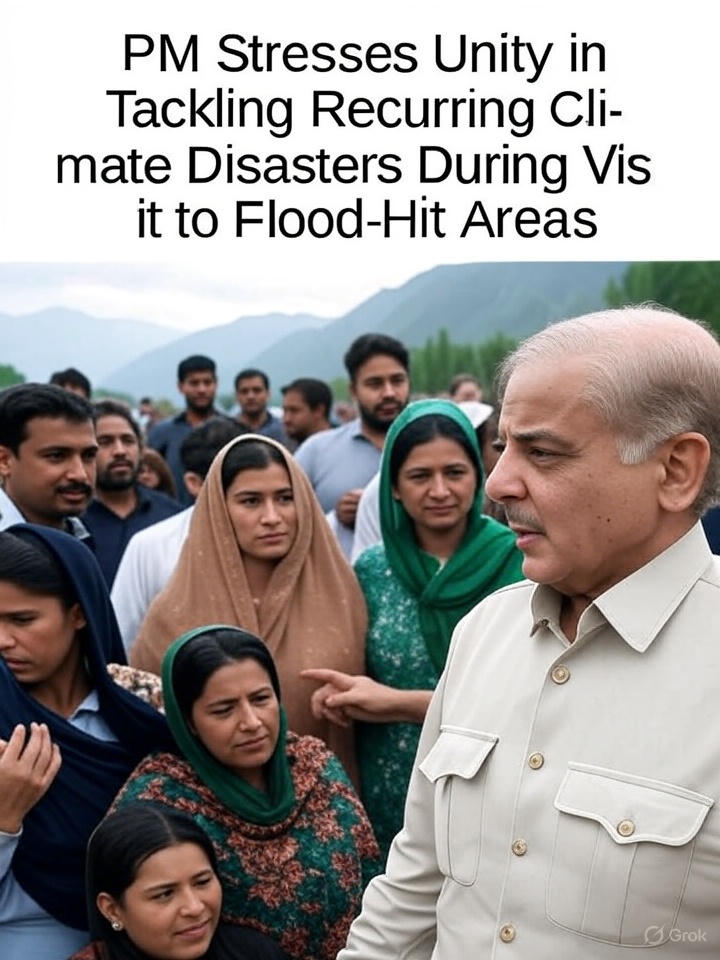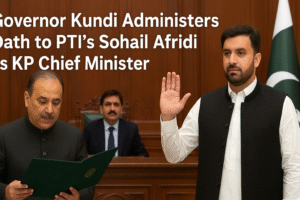PM Stresses Unity in Tackling Recurring Climate Disasters During Visit to Flood-Hit Areas

Introduction
Climate change has emerged as one of the greatest challenges of the 21st century, disrupting lives, economies, and environments across the globe. Pakistan, despite contributing less than 1% of global greenhouse gas emissions, has repeatedly faced the brunt of extreme weather events. The Prime Minister’s recent visit to flood-affected areas once again highlighted the urgency of addressing these challenges collectively. During the visit, the Premier emphasized unity, resilience, and strategic planning as key factors in tackling recurring climate disasters.
This comprehensive article explores the Prime Minister’s message, the ground realities of flood-hit communities, the historical context of recurring climate disasters in Pakistan, and the broader global perspective. It will also analyze the government’s relief strategies, the international response, the role of local communities, and long-term climate resilience policies.(PM stresses unity, recurring climate disasters, flood-hit areas Pakistan, Pakistan climate resilience, Prime Minister visit floods, Pakistan humanitarian crisis, climate finance for Pakistan, long-term disaster strategy)
The Prime Minister’s Visit to Flood-Hit Areas
The Prime Minister personally toured several flood-ravaged districts where entire communities have been uprooted by devastating monsoon rains. The visit carried symbolic and practical importance:
-
Symbolic Value: It showcased the government’s empathy and solidarity with flood victims.
-
Practical Value: It provided the Premier firsthand insight into the scale of destruction and the urgent needs of the people.
During the visit, the Prime Minister met displaced families, inspected relief camps, and held consultations with local administration and military personnel engaged in rescue operations. His remarks focused on the necessity of unity among provinces, institutions, and citizens to combat recurring natural calamities.
PM’s Key Message: Unity in the Face of Climate Challenges
The recurring floods have reinforced a critical point: climate disasters are not a one-time event but a persistent reality. The PM’s message was clear:
-
Unity Across Provinces: Climate change knows no borders; it affects Sindh, Punjab, Khyber Pakhtunkhwa, and Balochistan alike. Therefore, inter-provincial coordination is essential.
-
Government–Citizen Collaboration: Relief operations require both state-led initiatives and grassroots participation.
-
Institutional Strengthening: Strengthening the National Disaster Management Authority (NDMA), Provincial Disaster Management Authorities (PDMAs), and local councils is vital for disaster preparedness.
-
International Partnerships: Pakistan needs continuous support from the global community in climate financing and technology transfer.
The Prime Minister reiterated that climate resilience cannot be built without unity, and recurring disasters demand long-term solutions rather than temporary fixes.
Historical Context: Pakistan’s Vulnerability to Climate Disasters
Pakistan ranks among the most climate-vulnerable countries in the world. Over the past two decades, the country has witnessed repeated floods, droughts, heatwaves, and glacial melt events.(PM stresses unity, recurring climate disasters, flood-hit areas Pakistan, Pakistan climate resilience, Prime Minister visit floods, Pakistan humanitarian crisis, climate finance for Pakistan, long-term disaster strategy)
Major Climate Disasters in Recent History:
-
2010 Super Floods: Considered the worst in Pakistan’s history, affecting over 20 million people.
-
2014 Floods: Ravaged Punjab and parts of Sindh, leading to widespread displacement.
-
2020 Urban Flooding in Karachi: Highlighted the challenges of unplanned urbanization.
-
2022 Catastrophic Floods: Submerged one-third of the country, displaced 33 million people, and caused $30 billion in economic damages.
These events underscore that recurrence is no longer an exception but the norm. Climate experts warn that future monsoon seasons could bring even more unpredictable and intense flooding.
The Humanitarian Crisis in Flood-Hit Areas
During his visit, the Prime Minister was briefed on the scale of human suffering in the affected regions:
-
Displacement: Thousands of families are living in temporary shelters with limited access to food, clean water, and healthcare.
-
Health Risks: Waterborne diseases such as cholera, dengue, and malaria rise significantly after floods.
-
Livelihood Destruction: Farmers have lost crops and livestock, while local businesses face collapse.
-
Educational Setback: Schools are either destroyed or being used as shelters, disrupting children’s education.
The PM acknowledged these hardships and assured victims of government support in both immediate relief and long-term rehabilitation.
Government’s Relief and Rehabilitation Efforts
The government has launched multi-layered strategies to address the crisis:
-
Emergency Relief Camps: Providing food, medical supplies, and safe drinking water.
-
Cash Grants: Distributing financial aid to displaced families through the Benazir Income Support Program (BISP).
-
Infrastructure Rehabilitation: Rebuilding roads, bridges, and schools to restore normalcy.
-
Climate-Resilient Housing Projects: Constructing flood-resistant homes in vulnerable districts.
-
Healthcare Campaigns: Vaccination drives and mobile health units to prevent disease outbreaks.
The Prime Minister has directed all relevant ministries to coordinate with NDMA and provincial governments to ensure speedy relief.
The Role of Armed Forces and Civil Society
The Prime Minister appreciated the role of the Pakistan Army, Navy, and Air Force in conducting rescue missions, evacuations, and delivering aid. Civil society organizations, NGOs, and youth volunteers have also played a crucial role in supporting flood victims.
This collaboration reinforces the PM’s central message: unity is the key to overcoming disasters.
International Response and Climate Diplomacy
The PM highlighted that Pakistan cannot tackle climate challenges alone. During his visit, he once again called upon the international community for:
-
Climate Finance: Fulfilling the $100 billion annual climate finance commitment made by developed nations.
-
Loss and Damage Fund: Operationalizing the fund pledged at COP27 to compensate vulnerable countries.
-
Technology Transfer: Sharing advanced forecasting systems and resilient agricultural technologies.
-
Debt Relief: Providing debt relief or restructuring to enable Pakistan to invest in climate adaptation.
Countries such as China, the United States, the United Arab Emirates, and international agencies like the UN, World Bank, and IMF have pledged support. However, the PM emphasized the need for sustained, long-term global assistance.
Building Long-Term Climate Resilience
Beyond immediate relief, the PM stressed the importance of preparing for future disasters through sustainable policies. Key priorities include:
-
Early Warning Systems: Expanding modern meteorological networks to issue timely flood alerts.
-
Water Management: Constructing reservoirs and improving canal systems to control excess rainfall.
-
Urban Planning: Introducing strict building codes to prevent urban flooding.
-
Reforestation Campaigns: Expanding the “10 Billion Tree Tsunami” project to mitigate deforestation.
-
Renewable Energy: Reducing dependence on fossil fuels and shifting towards solar, wind, and hydropower.
-
Community Training: Educating local populations in disaster preparedness and first aid.
The Economic Cost of Recurring Climate Disasters
The PM also drew attention to the massive financial toll of recurring floods:
-
GDP Losses: Floods in 2022 alone shaved nearly 2% off Pakistan’s GDP.
-
Agricultural Impact: Damage to crops like rice, cotton, and wheat threatens food security.
-
Industrial Slowdown: Disrupted supply chains halt production in major sectors.
-
Poverty Rise: Millions pushed below the poverty line due to livelihood losses.
He emphasized that building climate resilience is not just an environmental necessity but also an economic survival strategy.
Voices from the Affected Communities
The Prime Minister’s visit provided an opportunity for flood victims to share their stories:
-
Farmers lamented the loss of entire harvests.
-
Mothers worried about malnutrition among children.
-
Youth expressed concern about interrupted education.
-
Elders recalled how floods now arrive “every year” instead of once in decades.
These voices underline the human face of climate change, making it clear that unity and policy reforms are not optional but essential.
Conclusion
The Prime Minister’s message of unity in combating recurring climate disasters resonates strongly in a country repeatedly battered by nature’s fury. His visit to flood-hit areas highlighted the urgency of coordinated action at local, national, and global levels.
Pakistan’s struggle against climate disasters is not just a national challenge but a global test of fairness and responsibility. As the PM rightly emphasized, only through solidarity, resilience, and long-term planning can Pakistan and the world meet the recurring challenge of climate change.
PM stresses unity, recurring climate disasters, flood-hit areas Pakistan, Pakistan climate resilience, Prime Minister visit floods, Pakistan humanitarian crisis, climate finance for Pakistan, long-term disaster strategyPM stresses unity, recurring climate disasters, flood-hit areas Pakistan, Pakistan climate resilience, Prime Minister visit floods, Pakistan humanitarian crisis, climate finance for Pakistan, long-term disaster strategyPM stresses unity, recurring climate disasters, flood-hit areas Pakistan, Pakistan climate resilience, Prime Minister visit floods, Pakistan humanitarian crisis, climate finance for Pakistan, long-term disaster strategy




